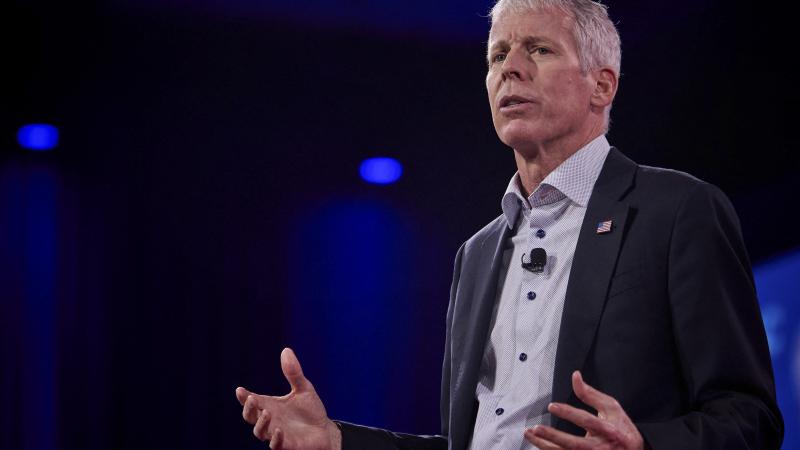IEA predicts peak fossil fuel demand by 2030 while oil companies profit and merge for future growth
Solid financial earnings since the pandemic and billion-dollar mergers of major oil companies suggest the industry doubts the IEA's predictions that demand for oil will peak before 2030.
A new report from the International Energy Agency estimates that demand for oil will peak prior to 2030. The projections, which were part of the IEA’s influential World Energy Outlook report, stand in stark contrast to recent business decisions in the oil and gas industry.
The day before the IEA report was released, Chevron announced it was buying Hess Corp. for $53 billion. Two weeks before that, Exxon Mobil announced it would merge with Pioneer Resources in a deal valued at $59.5 billion.
Reuters reports that Chesapeake Energy is in talks to acquire Southwestern Energy. If the deal is completed, it would make the company the top shale gas producer in America by market value.
The CBC reports that Canada’s oil and gas sector is also seeing waves of high-profile mergers and acquisitions.
The day the report was published Saudi Arabia’s Energy Minister Prince Abdulaziz bin Salman said at a global investment conference in Riyadh, Saudi Arabia, that his country was investing in increasing oil capacity. “We are investing not to create a stranded asset,” Abdulaziz said, according to Oilprice.com.
Energy analyst David Blackmon told Just The News these billion-dollar business deals are not what you’d see in an industry whose leaders are expecting a decline in demand for its product in the next several years. “Nobody in the oil and gas business really believes this nonsense about stranded assets, and that's from my conversations with executives from dozens of companies,” Blackmon said.
The IEA had made statements about its peak demand predictions ahead of the release of the report. In September, OPEC released a statement critical of the IEA’s predictions, calling them “dangerous” and “Ideologically driven.”
“Such narratives only set the global energy system up to fail spectacularly. It would lead to energy chaos on a potentially unprecedented scale, with dire consequences for economies and billions of people across the world,” OPEC Secretary General, HE Haitham Al Ghais, said in the statement.
Tim Stewart, president of the U.S. Oil and Gas Association, said that the claims of decreasing fossil fuel demand are “chatter and happy talk” that ignore that there are no viable replacements for products derived from petroleum, which includes batteries, asphalt and ibuprofen.
“Despite the media and political narrative that our industry is in its death throes, the smart money always bets on fossil fuels because the entire world and the world economies depend on us for virtually everything from agriculture to transportation,” Stewart told Just The News.
According to the IEA report, the share of fossil fuels in the global energy supply, which has hovered around 80% for decades, will decline to 73% by 2030. Much of that decrease would be due to reductions on coal, with oil and natural gas demand remaining essentially flat after 2030.
The report attributes its projections to the global number of electric cars on the road increasing ten-fold, the mix of renewable energy resources increasing from 30% to 50%, electric heating systems outselling fossil fuel broilers, and three times as much investment in offshore wind projects than in coal- and gas-fired power plants.
“The transition to clean energy is happening worldwide and it’s unstoppable. It’s not a question of ‘if’, it’s just a matter of ‘how soon’ – and the sooner the better for all of us,” said IEA Executive Director Fatih Birol, in a statement on the report’s release.
Writing on oilprice.com, Cyril Widdershoven, senior researcher at Hill Tower Resource Advisors, said the IEA report relies on some overly optimistic assumptions about decreasing demand for petroleum in China, which ignore the country’s substantial investments in coal, natural gas and crude oil inside and outside of China.
The IEA report, Widdershoven wrote, also ignores that the growth of EVs is predicated on extensive government subsidies, the financially troubled offshore wind industry, and the supply chain issues that impede renewable energy targets.
While the alternative energy industry has struggled financially in the past year, the five largest oil companies saw record profits in 2022, and the industry is having a good year so far.
Blackmon said that the reason these mergers are happening is because the companies aren’t viewing the financial success of the past couple years as a blip. Through these mergers and acquisitions, the companies are increasing their drilling opportunities to have plenty of access to a product that they believe will be in demand for years to come.
“These are not companies that are planning to be out of business in 10 years, like the Biden administration wants them to be,” Blackmon said.
Chevron CEO Mike Wirth spoke frankly to the Financial Times about his confidence in the industry’s future. Ahead of the announcement of the Hess merger, Wirth said that the EIA’s projections aren’t “remotely right.”
Wirth also defended the industry, saying, “We are not selling a product that is evil. We’re selling a product that’s good.”
Stewart said the past two and a half years have been some of the hardest for the industry in terms of the political environment it has faced, and he blames the industry for not pushing back more against its critics.
“We have rarely called them out for their hypocrisy. They use our products dozens of times every day while talking about how much everyone should hate our industry. That has been a critical mistake in my opinion,” Stewart said.
Stewart said he hopes the industry continues to speak of the benefits of fossil fuels. He said industry leaders often took the easy road and kept their heads down as activists and the Biden administration demonized the industry. Appeasement, he said, is never a winning strategy.
“Now that the net-zero degrowth and de-industrialization philosophies have permeated the highest levels of public policy, future generations are at real risk of living in scarcity and energy poverty. We need to be much more bold. Our grandkids' future depends on us taking a stand,” he said.
The Facts Inside Our Reporter's Notebook
Links
- new report
- Chevron announced
- Exxon Mobil announced
- Reuters reports that Chesapeake Energy
- CBC reports that Canadaâs oil and gas sector
- according to Oilprice.com
- released a statement
- relies on some overly optimistic assumptions
- substantial investments in coal
- natural gas
- crude oil
- extensive government subsidies
- financially troubled offshore wind industry
- supply chain issues
- alternative energy industry has struggled
- saw record profits in 2022
- industry is having a good year so far
- spoke frankly to the Financial Times
- degrowth and de-industrialization philosophies
















